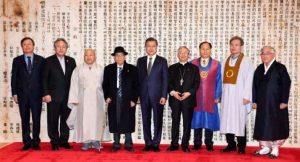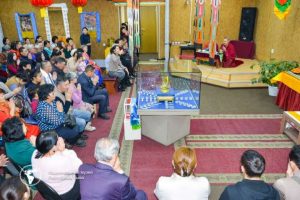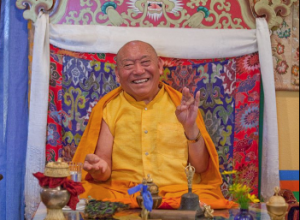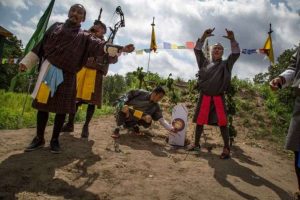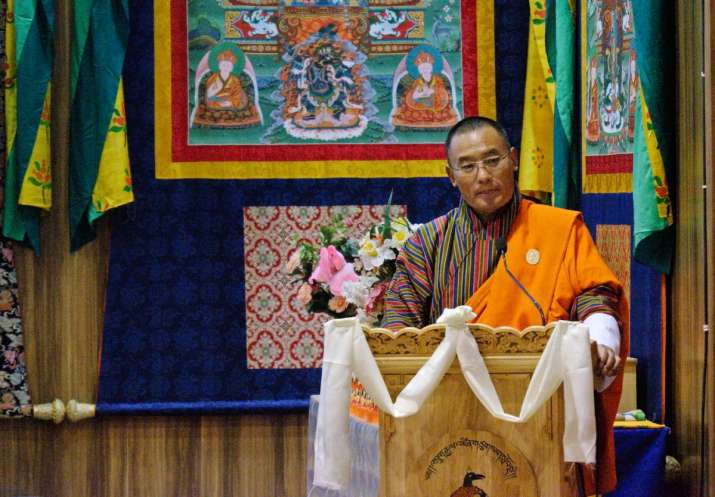
THIMPHU—Speaking at the International Vajrayana Conference held in the Bhutanese capital Thimphu last week,* the prime minister of Bhutan, Lyonchhen Dasho Tshering Tobgay, proffered a new vision aimed at ensuring the preservation and development of the Vajrayana Buddhist tradition in the 21st century, proposing the establishment of an international center of Vajrayana Buddhism.
The prime minister noted that regardless of where the proposed center is located, it’s underlying impetus should be to facilitate the study, practice, and preservation of Vajrayana Buddhism so that the teachings can continue to flourish across the world.
“We must have an international Vajrayana center. It doesn’t matter where it’s located, what matters is that we preserve the essence [of Vajrayana Buddhism] and let it flourish throughout the world and throughout the universe for all time. This is what’s important. We cannot entertain any risk of deterioration, and therefore I have floated the idea,” Tshering Tobgay emphasized.
“If we need a home for an international Vajrayana center for posterity, to hand over to future generations, then Bhutan could be a possible location to host such a center. I dare say the environment is right in Bhutan. I dare say that we in Bhutan need it as desperately as anybody else anywhere in the world. We in Bhutan need the center desperately because we are going through so many changes here—socially, economically, politically. Therefore we need a center like this to help us anchor ourselves in our real essence; the essence that has been gifted to us by our teachers over the centuries.”
Bhutan, nestled in the foothills of the Himalayan mountain range, and sandwiched between two political and economic heavy hitters India and China, is the world’s last remaining Vajrayana Buddhist country. The spiritual tradition is embedded in the very consciousness and culture of this remote land, where it has flourished with an unbroken history that dates back to its introduction from Tibet by Padmasambhava, also known as Guru Rinpoche, in the 8th century.
“Buddhism is also a major element in the shared heritage between India and Bhutan, as well as Bhutan and other countries. Buddhism remains a uniting factor stretching back thousands of years. Conferences of this nature will only contribute to strengthening a broader base in the relationship between and among the people of all nations,” said Tshering Tobgay. “As the last surviving Vajrayana kingdom, I would humbly offer to host such a center in Bhutan. But you must bless it and you must work together with us to develop this center for ourselves and for future generations of the world.”
https://youtube.com/watch?v=lBOFwhdVDKQ
Buddhist Cham performance at the International Vajrayana Conference in Thmphu. Video by Craig Lewis
The proposal was echoed during a special post-conference session with an expression of support from conference delegate Khensur Geshe Jangchup Choeden, former abbot of Gaden Monastery in India and executive director of the Geluk International Foundation.
“It is really an important point to have a body, an organization which should raise the voice of Vajrayanists. I think we’re not talking in political terms here, we’re talking about a commonly shared heritage, a culture, a very important human heritage that has the potential to help all of humanity,” he said. “I don’t think there is any other place better than Bhutan to have that kind of organization. But how to establish it and build it up? I think we need to do a lot of thinking, a lot of drafting, and after that come out with some kind of common understanding and agreement from which we can do something. . . . I’m more than happy to have Bhutan leading this initiative and trying to build something. I would like to express deep thanks to His excellency the prime minister for putting this proposal in the conference.”
Almost 75 per cent of Bhutan’s population identify as Buddhists, according to data for 2010 from the Washington, DC-based Pew Research Center, with Hinduism accounting for the majority of the remainder. Most of Bhutan’s Buddhists follow either the Drukpa Kagyu or the Nyingma school of Vajrayana Buddhism.









